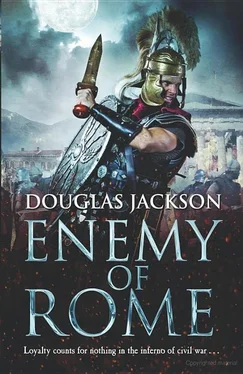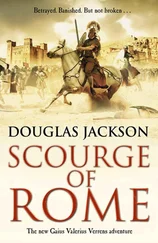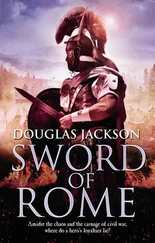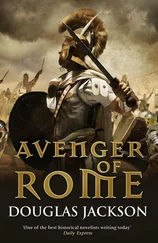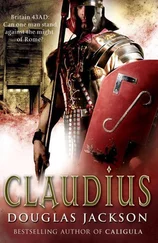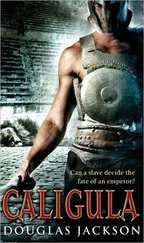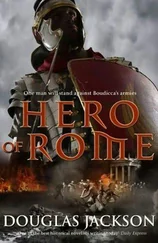Douglas Jackson - Enemy of Rome
Здесь есть возможность читать онлайн «Douglas Jackson - Enemy of Rome» весь текст электронной книги совершенно бесплатно (целиком полную версию без сокращений). В некоторых случаях можно слушать аудио, скачать через торрент в формате fb2 и присутствует краткое содержание. Год выпуска: 2014, ISBN: 2014, Издательство: Bantam Press, Жанр: Исторические приключения, на английском языке. Описание произведения, (предисловие) а так же отзывы посетителей доступны на портале библиотеки ЛибКат.
- Название:Enemy of Rome
- Автор:
- Издательство:Bantam Press
- Жанр:
- Год:2014
- ISBN:9781448127696
- Рейтинг книги:4 / 5. Голосов: 1
-
Избранное:Добавить в избранное
- Отзывы:
-
Ваша оценка:
- 80
- 1
- 2
- 3
- 4
- 5
Enemy of Rome: краткое содержание, описание и аннотация
Предлагаем к чтению аннотацию, описание, краткое содержание или предисловие (зависит от того, что написал сам автор книги «Enemy of Rome»). Если вы не нашли необходимую информацию о книге — напишите в комментариях, мы постараемся отыскать её.
Enemy of Rome — читать онлайн бесплатно полную книгу (весь текст) целиком
Ниже представлен текст книги, разбитый по страницам. Система сохранения места последней прочитанной страницы, позволяет с удобством читать онлайн бесплатно книгу «Enemy of Rome», без необходимости каждый раз заново искать на чём Вы остановились. Поставьте закладку, и сможете в любой момент перейти на страницу, на которой закончили чтение.
Интервал:
Закладка:
Domitianus’s affection had grown into obsession when Marcus Salvius Otho ordered him to escort her back to Rome on the eve of the battle of Bedriacum. But when news came of Otho’s defeat it quickly became clear that obsession had been replaced by ownership. Domitianus assumed she was his for the taking, and all that was required was for her to recognize the fact. He still followed her around like a puppy, indulging what he believed were her needs, but now there were additional irritations. Little ‘presents’, compliments whispered just too low for Sabinus or his servants to hear, and the occasional inappropriate brush of the fingers that she met with a stare of outraged dignity. When patience ran out and word of the true scale of the disaster had arrived in Rome she’d screamed at him to leave her alone. He’d only laughed and said she was a typical woman, overwrought and prone to exaggeration. Sabinus suspected something, but had clearly decided that whatever it was was between his nephew and Domitia. But there had been times recently when the look in Domitianus’s eyes frightened her; moments, when he thought she wasn’t looking at him, when warmth was replaced by a diabolical rage, devotion by lust, and tenderness by the threat of violence.
Sabinus stalked off. A second later she felt hot breath on the back of her neck, and she wasn’t sure whether she heard the whisper or only imagined it. ‘You will be mine. It is only a matter of time.’
She had to get out of here.
But only one man could help her. And for all she knew that man was dead.
Aulus Vitellius Germanicus Augustus felt an ominous liquid gurgling in his lower stomach and fought to conceal the look of unease that was the natural result. His digestive system, so reliable for so many years, appeared to have become confused or unbalanced by the strictures imposed by his new eminence. He’d always been known for his gargantuan appetite and was aware men called him the Emperor of the Dinner Table, but it didn’t concern him. A man should enjoy his food, and if the consumption of it gave him a presence to match his appetite, then so be it. Nothing had spoiled his pleasure, until now. Who would have thought that after so many years of bequeathing vexatious decisions to those more able to deal with them, he should have managed to elevate himself to a position where the problems of the world were the sole province of a single, unlikely, and, he feared, singularly ill-equipped personage. Not that you would know that from the reaction of those in the Senate, who hailed his tormented, hard-won decisions as god-inspired works of genius. Yes, he’d managed to make one or two patently sensible changes. He’d earned the gratitude of his soldiers by outlawing the selling of furloughs and exemptions by centurions. The populace applauded his order to cast every astrologer and like charlatan from the soil of Italia. After Nero’s suicide, Galba’s murder, and the demise of Otho, the mob were happy with the prospect of stability, the games he’d promised, and bread in their stomachs. True, he had made mistakes. He should not have blurted out that Otho’s grave marker was a little tomb, fit only for a little man. In retrospect it was unfitting, had been said in anger at the trouble Otho had created, and he regretted it. Still, the Senate would support him as long as the army did, and the army would support him as long as they were paid — and as long as they were winning.
The thought generated a new spasm and he forced a smile to disguise the discomfort of the moment from the two men who shared the room with him in the great Golden House Nero had built to reflect his glory. Each was clad in the purple-striped toga of a senator, but worn in the distinctive manner, tied at the middle with the cinctus Gabinus , that marked a serving consul of Rome. Suffect consuls, it was true, filling a prescribed role for a prescribed period of time, but consuls no less. When they marched north, the fasces borne by their dozen lictors would carry the axe heads that proclaimed their right to put to death the enemies of empire.
They were the generals of his armies: Gaius Fabius Valens and Aulus Caecina Alienus. His greatest strength and his greatest weakness.
Valens was the elder and normally a man of frighteningly violent disposition. Thin and spare as an unsheathed gladius , blank-eyed, with a nature as vicious as his weaselly features, he was as feared by his officers as he was respected by his troops. Yet the grey pallor and pink eyes staring out from beneath drooping lids took the edge off the threat. He looked old; old and worn out.
‘A tincture with your wine, general?’ Vitellius suggested. ‘My physician can mix it up in an instant.’
Valens grunted his thanks, but shook his head. ‘It’s nothing. A flux that lays me low for a few days. I fear the waters of the Padus did not agree with me.’
‘They agreed with Otho less, I’d say.’ Caecina was plainly enjoying his rival’s discomfort. Ten years younger, he had handsome tanned features and an appealing nature that hid an ambition as great as his opinion of himself, which was enormous. Despite the setback at Placentia, where his desperation to outdo Valens had almost torn the heart out of his army, that opinion remained undiminished. Aulus Caecina Alienus was a young man on the rise. Vitellius had a suspicion he would not be satisfied with a consulship for long. He decided he’d feel more comfortable when the young general was on campaign, where his silver tongue could do less damage than among the marble columns of the Forum.
‘You are …’ Another rumble erupted in the Emperor’s stomach, this time audible to the two men facing him. He struggled to suppress it, only to release an involuntary fart on a scale with his massive frame. Valens looked horrified and Caecina was about to say something more dangerous than clever, but thought better of it. Vitellius shifted uneasily in his seat.
‘I apologize, consuls, but I too am feeling a little indisposed. However, I think we may continue.’ He called to his secretary, Asiaticus, hovering attentively by the doorway, to bring a map of northern Italia. The tall Greek produced a scroll and pinned it to the large mahogany table that dominated this corner of the Emperor’s personal quarters. ‘Vespasian, that low-born mule driver, has challenged the authority vested in me by the Senate and people of Rome. The legions of Syria and Egypt have declared for him. They are far away, but of greater concern is the support of the traitors in Pannonia and Moesia who would have fought for Otho. You are my generals. Advise me.’
Valens blinked. Surely it was obvious. ‘You must lead your army north at the first opportunity, Caesar. Whoever controls the Padus valley controls Italia, and by default the Empire. Choose your battlefield and draw the Balkan legions to you. They are Vespasian’s elite; seasoned troops hardened by years of fighting on the Danuvius. Defeat them and you defeat him.’
Vitellius frowned. This talk of leading and choosing battlefields perplexed him. Wasn’t that why he employed generals and showered honours upon them? He was no coward. A coward did not become Emperor of Rome. But he was prudent, and a prudent man knew his strengths. He studied the two soldiers. ‘How long will it take to concentrate our forces and reach the Padus?’
Caecina looked away and Valens sniffed. ‘Longer than it would have taken if we’d left the First Germanica with the Fifth and Twenty-first Rapax on the Padus as I suggested.’ Vitellius frowned at the implied criticism of his decision to bring the majority of his legions south to take part in his triumphal entry into Rome. The spectacle had been a masterpiece of might and dignity, but the aftermath little short of a disaster. Thousands of troops full of themselves with victory spread through the city taking what they wanted, setting up camp where it suited them and polluting the streets and streams with their filth. With them they’d brought disease, which had spread rapidly, weakening the men and their units. These required replacements, who were already in short supply because he had been forced to replace much of the Praetorian Guard which had still been loyal to Otho’s memory. The worst offenders had been the Batavian auxiliaries who had proved so ungovernable on Valens’ march south. Vitellius had been forced to send them back to their homeland where they would undoubtedly cause problems for the governor of Germania. Still, none of that could be changed. He held the other man’s stare until the legate continued: ‘A week to bring the legions together west of the mountains.’ Valens coughed. ‘Another two to reach the Padus.’
Читать дальшеИнтервал:
Закладка:
Похожие книги на «Enemy of Rome»
Представляем Вашему вниманию похожие книги на «Enemy of Rome» списком для выбора. Мы отобрали схожую по названию и смыслу литературу в надежде предоставить читателям больше вариантов отыскать новые, интересные, ещё непрочитанные произведения.
Обсуждение, отзывы о книге «Enemy of Rome» и просто собственные мнения читателей. Оставьте ваши комментарии, напишите, что Вы думаете о произведении, его смысле или главных героях. Укажите что конкретно понравилось, а что нет, и почему Вы так считаете.
